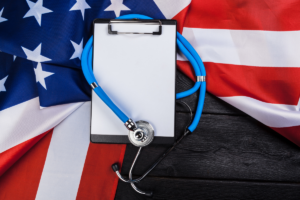This blog reviews the requirements for a merchant mariner physical exam in Florida. The Medical Practitioner must perform the physical exam, but the medical staff can complete the remainder of the testing. This testing includes height, weight, blood pressure, pulse, vision, and hearing. Knowing the requirements for each of these tests can help applicants know what to expect at their US Coast Guard physical in Florida.
There is no specific height or weight requirement for mariners; however, the Body Mass Index, or BMI of a candidate determines some of what the examiner needs to test. The easiest way to calculate BMI is to divide weight in pounds (lb) by height in inches (in) squared and multiply by 703. Alternatively, there are calculators online that are easy to use to calculate BMI knowing height and weight. The important number for BMI is 40 because candidates with a BMI of 40 or higher will need to complete the demonstration of physical ability shown in Section VIII of the CG-719K. The concern is that a higher BMI can limit mobility and endurance that can interfere with the ability to complete duty requirements. While some of the physical abilities that must be demonstrated would only be realistic to do on board a vessel, the examiner can simulate these circumstances in the office to ensure requirements are met.
The blood pressure maximum varies by age, but in general should be under 160 for systolic pressure and 100 for diastolic pressure. Ensuring the candidate is relaxed and the blood pressure cuff is the correct size are important parts of getting an accurate reading. Some candidates may have “white coat hypertension” which is blood pressure that is higher just from being in a medical office. In this situation, letting the candidate relax for a few minutes may help the blood pressure return to its usual level.
Hearing is tested initially with the spoken voice. If the candidate is unable to pass this attempt, additional testing can be completed in the form a formal audiogram. Again, if you suspect hearing may be an issue, be sure to go to a practice like Sea Medicine where an audiogram is readily available. If the candidate is unable to pass this, a hearing aid limitation may be required for the medical certificate, but an experienced examiner can work through the options with the candidate.
While not explicitly part of the examination, it is important to note that a history of medical conditions, especially those that are ongoing, are an important part of the visit. The examiner will review such conditions along with any medications. If the conditions or medications could have physical manifestations, an experienced examiner will look for these during the physical exam. If issues are present, the examiner can work with the candidate to fully document the conditions to maximize the likelihood of obtaining the medical certificate. This may include having the candidate obtain medical records, letters from treating physicians, and results from testing. In most cases, the Coast Guard is looking for at least six years of being physically capable and stable if a candidate has a chronic medical condition or medication. The greatest concern is potential for incapacitation, motor impairment, or decision making which can be safety risks.
Having a knowledgeable, experienced examiner can mean the difference between a prolonged, expensive medical certification process and a successful submission on the first attempt. Sea Medicine only does certification exams, so we are fully focused on the issues marine applicants face. We can answer your questions about the application process including medical conditions and medications, so feel free to call us at (727) 648-2402 or email us at aweinberg@medavex.org. Appointments can be made by phone or online at www.seadocfl.com. Consultation appointments are also available to discuss how to approach your merchant mariner physical exam in Florida. A consultation is critically important for candidates with medical conditions or medications that could potentially interfere with the ability to perform duties at sea.





